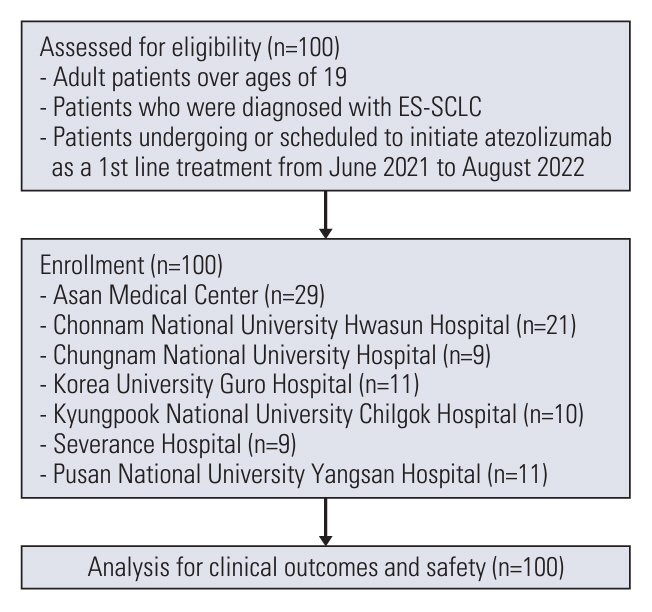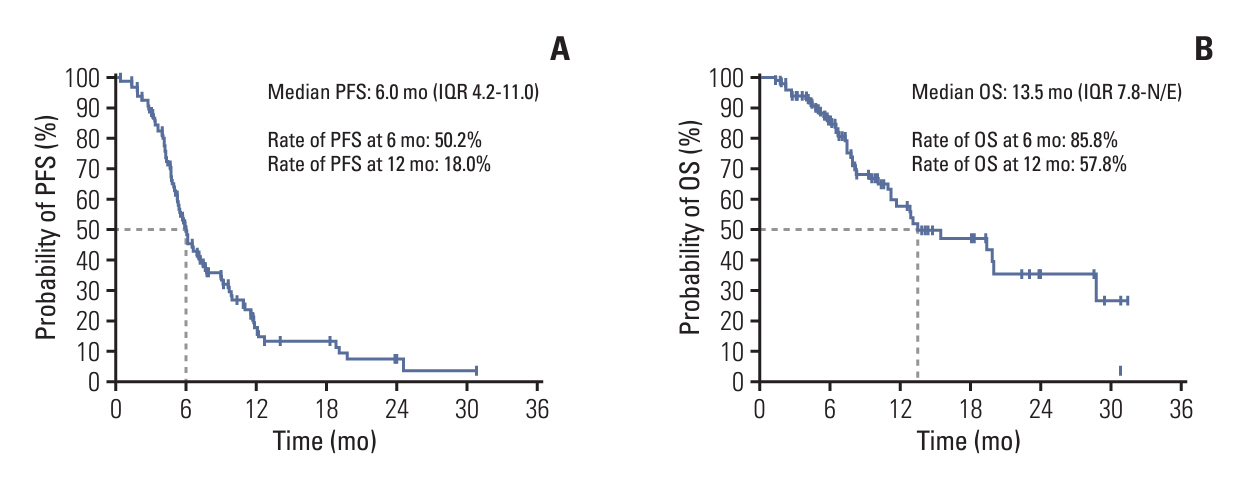Cancer Res Treat.
2024 Apr;56(2):422-429. 10.4143/crt.2023.913.
The Real-World Outcome of First Line Atezolizumab in Extensive-Stage Small Cell Lung Cancer: A Multicenter Prospective Cohort Study
- Affiliations
-
- 1Department of Pulmonary and Critical Care Medicine, Asan Medical Center, University of Ulsan College of Medicine, Seoul, Korea
- 2Division of Pulmonary and Critical Care Medicine, Department of Internal Medicine, Ewha Womans University Mokdong Hospital, Ewha Womans University College of Medicine, Seoul, Korea
- 3Department of pulmonology, Nowon Eulji Medical Center, Eulji University School of Medicine, Seoul, Korea
- 4Department of Oncology, Asan Medical Center, University of Ulsan College of Medicine, Seoul, Korea
- 5Department of Internal Medicine, Chonnam National University Hwasun Hospital, Chonnam National University Medical School, Hwasun, Korea
- 6Division of Pulmonary, Allergy, and Critical Care Medicine, Department of Internal Medicine, Korea University Guro Hospital, Korea University College of Medicine, Seoul, Korea
- 7Division of Pulmonology, Allergy, and Critical Care Medicine, Department of Internal Medicine, Pusan National University Yangsan Hospital, Yangsan, Korea
- 8Department of Internal Medicine, Kyungpook National University, School of Medicine, Daegu, Korea
- 9Division of Pulmonology, Department of Internal Medicine, Chungnam National University College of Medicine, Daejeon, Korea
- 10Division of Pulmonary and Critical Care Medicine, Department of Internal Medicine, Severance Hospital, Yonsei University College of Medicine, Seoul, Korea
- KMID: 2554333
- DOI: http://doi.org/10.4143/crt.2023.913
Abstract
- Purpose
The addition of immune checkpoint inhibitors to chemotherapy has improved survival outcomes in patients with extensive-stage small cell lung cancer (ES-SCLC). However, their real-world effectiveness remains unknown. Therefore, we investigated the effectiveness of atezolizumab plus chemotherapy in ES-SCLC in actual clinical settings.
Materials and Methods
In this multicenter prospective cohort study, patients with ES-SCLC receiving or scheduled to receive atezolizumab in combination with etoposide and carboplatin were enrolled between June 2021 and August 2022. The primary outcomes were progression-free survival (PFS) and the 1-year overall survival (OS) rate.
Results
A total of 100 patients with ES-SCLC were enrolled from seven centers. Median age was 69 years, and 6% had an Eastern Cooperative Oncology Group performance status (ECOG PS) ≥ 2. The median PFS was 6.0 months, the 1-year OS rate was 62.2%, and the median OS was 13.5 months. An ECOG PS of 2-3 and progressive disease as the best response were poor prognostic factors for PFS, while an ECOG PS of 2-3 and brain metastasis were associated with poor prognosis for OS. In addition, consolidative thoracic radiotherapy was found to be an independent favorable prognostic factor for OS (hazard ratio, 0.336; p=0.021). Grade ≥ 3 treatment-related adverse events were observed in 7% of patients, with treatment-related deaths occurring in 2% of patients.
Conclusion
We provided evidence of the favorable real-world effectiveness and safety of atezolizumab plus chemotherapy in ES-SCLC patients, including in the elderly and those with poor ECOG PS. Additional consolidative thoracic radiotherapy may also benefit ES-SCLC patients.
Keyword
Figure
Reference
-
References
1. Miller KD, Nogueira L, Devasia T, Mariotto AB, Yabroff KR, Jemal A, et al. Cancer treatment and survivorship statistics, 2022. CA Cancer J Clin. 2022; 72:409–36.
Article2. Kim HC, Jung CY, Cho DG, Jeon JH, Lee JE, Ahn JS, et al. Clinical characteristics and prognostic factors of lung cancer in Korea: a pilot study of data from the Korean Nationwide Lung Cancer Registry. Tuberc Respir Dis (Seoul). 2019; 82:118–25.
Article3. Rudin CM, Brambilla E, Faivre-Finn C, Sage J. Small-cell lung cancer. Nat Rev Dis Primers. 2021; 7:3.
Article4. Spigel DR, Townley PM, Waterhouse DM, Fang L, Adiguzel I, Huang JE, et al. Randomized phase II study of bevacizumab in combination with chemotherapy in previously untreated extensive-stage small-cell lung cancer: results from the SALUTE trial. J Clin Oncol. 2011; 29:2215–22.
Article5. Fukuoka M, Furuse K, Saijo N, Nishiwaki Y, Ikegami H, Tamura T, et al. Randomized trial of cyclophosphamide, doxorubicin, and vincristine versus cisplatin and etoposide versus alternation of these regimens in small-cell lung cancer. J Natl Cancer Inst. 1991; 83:855–61.
Article6. Baka S, Califano R, Ferraldeschi R, Aschroft L, Thatcher N, Taylor P, et al. Phase III randomised trial of doxorubicinbased chemotherapy compared with platinum-based chemotherapy in small-cell lung cancer. Br J Cancer. 2008; 99:442–7.
Article7. Socinski MA, Smit EF, Lorigan P, Konduri K, Reck M, Szczesna A, et al. Phase III study of pemetrexed plus carboplatin compared with etoposide plus carboplatin in chemotherapynaive patients with extensive-stage small-cell lung cancer. J Clin Oncol. 2009; 27:4787–92.
Article8. Farago AF, Keane FK. Current standards for clinical management of small cell lung cancer. Transl Lung Cancer Res. 2018; 7:69–79.
Article9. Horn L, Mansfield AS, Szczesna A, Havel L, Krzakowski M, Hochmair MJ, et al. First-line atezolizumab plus chemotherapy in extensive-stage small-cell lung cancer. N Engl J Med. 2018; 379:2220–9.
Article10. Peifer M, Fernandez-Cuesta L, Sos ML, George J, Seidel D, Kasper LH, et al. Integrative genome analyses identify key somatic driver mutations of small-cell lung cancer. Nat Genet. 2012; 44:1104–10.11. Rizvi NA, Hellmann MD, Snyder A, Kvistborg P, Makarov V, Havel JJ, et al. Cancer immunology. Mutational landscape determines sensitivity to PD-1 blockade in non-small cell lung cancer. Science. 2015; 348:124–8.
Article12. Paz-Ares L, Dvorkin M, Chen Y, Reinmuth N, Hotta K, Trukhin D, et al. Durvalumab plus platinum-etoposide versus platinum-etoposide in first-line treatment of extensive-stage small-cell lung cancer (CASPIAN): a randomised, controlled, open-label, phase 3 trial. Lancet. 2019; 394:1929–39.13. Rudin CM, Awad MM, Navarro A, Gottfried M, Peters S, Csoszi T, et al. Pembrolizumab or placebo plus etoposide and platinum as first-line therapy for extensive-stage small-cell lung cancer: randomized, double-blind, phase III KEYNOTE-604 study. J Clin Oncol. 2020; 38:2369–79.
Article14. National Comprehensive Cancer Network. Small cell lung cacner (version 3.2023) [Internet]. Plymouth Meeting, PA: National Comprehensive Cancer Network;c2023. [cited 2023 Jul 7]. Available from: https://www.nccn.org/professionals/physician_gls/pdf/sclc.pdf.15. Kim SH, Jo EJ, Mok J, Lee K, Kim KU, Park HK, et al. Realworld evaluation of atezolizumab and etoposide-carboplatin as a first-line treatment for extensive-stage small cell lung cancer. Korean J Intern Med. 2023; 38:218–25.
Article16. Sagie S, Maixner N, Stemmer A, Lobachov A, Bar J, Urban D. Real-world evidence for immunotherapy in the first line setting in small cell lung cancer. Lung Cancer. 2022; 172:136–41.
Article17. Elegbede AA, Gibson AJ, Fung AS, Cheung WY, Dean ML, Bebb DG, et al. A real-world evaluation of atezolizumab plus platinum-etoposide chemotherapy in patients with extensivestage SCLC in Canada. JTO Clin Res Rep. 2021; 2:100249.
Article18. Gaspar LE, McNamara EJ, Gay EG, Putnam JB, Crawford J, Herbst RS, et al. Small-cell lung cancer: prognostic factors and changing treatment over 15 years. Clin Lung Cancer. 2012; 13:115–22.
Article19. Ma X, Zhang Z, Chen X, Zhang J, Nie J, Da L, et al. Prognostic factor analysis of patients with small cell lung cancer: real-world data from 988 patients. Thorac Cancer. 2021; 12:1841–50.
Article20. Sperduto PW, Chao ST, Sneed PK, Luo X, Suh J, Roberge D, et al. Diagnosis-specific prognostic factors, indexes, and treatment outcomes for patients with newly diagnosed brain metastases: a multi-institutional analysis of 4,259 patients. Int J Radiat Oncol Biol Phys. 2010; 77:655–61.
Article21. Bremnes RM, Sundstrom S, Aasebo U, Kaasa S, Hatlevoll R, Aamdal S, et al. The value of prognostic factors in small cell lung cancer: results from a randomised multicenter study with minimum 5 year follow-up. Lung Cancer. 2003; 39:303–13.
Article22. Slotman BJ, van Tinteren H, Praag JO, Knegjens JL, El Sharouni SY, Hatton M, et al. Use of thoracic radiotherapy for extensive stage small-cell lung cancer: a phase 3 randomised controlled trial. Lancet. 2015; 385:36–42.
Article23. Rathod S, Jeremic B, Dubey A, Giuliani M, Bashir B, Chowdhury A, et al. Role of thoracic consolidation radiation in extensive stage small cell lung cancer: a systematic review and meta-analysis of randomised controlled trials. Eur J Cancer. 2019; 110:110–9.
Article24. Tang C, Wang X, Soh H, Seyedin S, Cortez MA, Krishnan S, et al. Combining radiation and immunotherapy: a new systemic therapy for solid tumors? Cancer Immunol Res. 2014; 2:831–8.
Article25. Ou SH, Ziogas A, Zell JA. Prognostic factors for survival in extensive stage small cell lung cancer (ED-SCLC): the importance of smoking history, socioeconomic and marital statuses, and ethnicity. J Thorac Oncol. 2009; 4:37–43.
Article26. Coronavirus disease (COVID-19) weekly epidemiological updates and monthly operational updates [Internet]. Geneva: World Health Organization;c2023. [cited 2023 Jul 17]. Available from: https://www.who.int/emergencies/diseases/novelcoronavirus-2019/situation-reports.27. The updates of COVID-19 in Republic of Korea [Internet]. Cheongju: Korea Disease Control and Prevention Agency;c2023. [cited 2023 Jul 17]. Available from: https://ncov.kdca.go.kr/en/.28. Ragavan MV, Legaspi N, LaLanne A, Hong JC, Small EJ, Borno HT. Analysis of serious adverse event reporting for patients enrolled in cancer clinical trials during the COVID-19 pandemic. JAMA Oncol. 2022; 8:1849–51.
Article
- Full Text Links
- Actions
-
Cited
- CITED
-
- Close
- Share
- Similar articles
-
- Real-world evaluation of atezolizumab and etoposide-carboplatin as a first-line treatment for extensive-stage small cell lung cancer
- Analysis of Factors Predicting the Real-World Efficacy of Atezolizumab and Bevacizumab in Patients with Advanced Hepatocellular Carcinoma
- A Clinical Therapeutic Results on Small Cell Lung Cancer
- Treatment for Extensive stage Small cell Lung Cancer
- Etoposide and cisplatin combination chemotherapy in extensive stage small cell lung cancer



